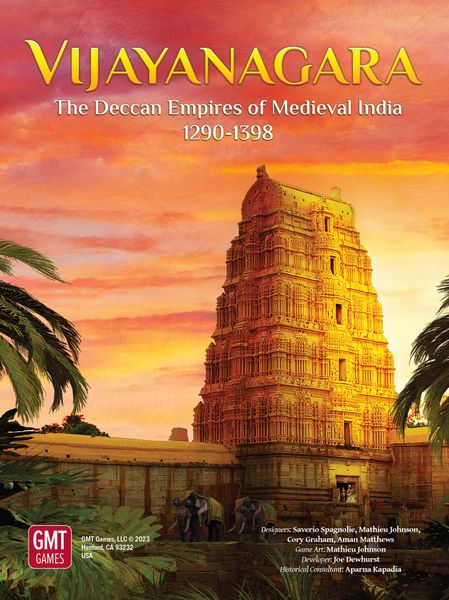Vijayanagara: The Deccan Empires of Medieval India, 1290-1398 (2024) Board Game
Brief History and Background Information
Vijayanagara: The Deccan Empires of Medieval India, 1290-1398 is a board game that takes players back to the medieval period in India, specifically focusing on the Deccan Empires. During this time, the Vijayanagara Empire was a dominant force in Southern India, known for its rich culture, art, and architecture. The game allows players to immerse themselves in the political, military, and economic challenges faced by the rulers of this empire.
Game Components of Vijayanagara: The Deccan Empires of Medieval India, 1290-1398
- Game board depicting the map of medieval India
- Player cards with unique abilities
- Campaign and battle cards
- Player tokens representing armies
- Resource tokens for managing economy and military
- Rulebook with instructions and historical background
How To Setup Vijayanagara: The Deccan Empires of Medieval India, 1290-1398
- Place the game board in the center of the table.
- Shuffle the campaign and battle cards and place them in designated areas.
- Each player selects a player card and corresponding tokens.
- Distribute starting resources to each player.
- Follow setup instructions for specific scenarios or campaigns.
Gameplay Mechanics and Game Objective
Players take on the role of rulers of the Vijayanagara Empire or other Deccan kingdoms, striving to expand their territories, manage resources, and outwit their opponents. The game involves area movement, card-driven campaigns and battles, and variable player powers. The objective is to achieve dominance and secure the legacy of your empire through strategic decision-making and tactical gameplay.
Player Experience
Pros:
- Immersive theme and historical setting
- Engaging gameplay with multiple strategic options
- Variable player powers add replay value
- Educational value in learning about medieval Indian history
Cons:
- Steep learning curve for new players
- Luck factor in card draws may impact outcomes
- Limited player interaction in some scenarios
Personal Thoughts on Vijayanagara: The Deccan Empires of Medieval India, 1290-1398
Vijayanagara: The Deccan Empires of Medieval India, 1290-1398 is a beautifully crafted game that offers a deep dive into a lesser-known period of Indian history. The blend of historical accuracy and strategic gameplay makes it a compelling choice for history buffs and board game enthusiasts alike. The game’s components are of high quality, and the attention to detail in the artwork is commendable.
In terms of pricing and availability, Vijayanagara may be on the higher end compared to some mainstream board games, but for the depth of gameplay and historical immersion it offers, the price is justified. It is worth the investment for those interested in medieval Indian history and strategic wargames.
Overall, Vijayanagara: The Deccan Empires of Medieval India, 1290-1398 is a game that I would recommend to players who enjoy complex strategy games and have an interest in exploring historical themes. It may not be suitable for casual gamers or those looking for quick gameplay, but for those willing to invest time and effort, it can be a rewarding experience.
Game Components of Vijayanagara: The Deccan Empires of Medieval India, 1290-1398
How To Setup Vijayanagara: The Deccan Empires of Medieval India, 1290-1398
Setting up the game involves placing the mapboard, shuffling and dealing the event cards, and distributing the wooden pieces and counters according to each faction’s starting conditions. Players will also need to refer to the play aids for faction-specific setups and rules. The game is designed to be streamlined, with most rules and player actions visible on the table through player aids and cards.
Gameplay Mechanics and Game Objective
– Asymmetric roles for the Delhi Sultanate, Bahmani Kingdom, and Vijayanagara Empire.
– Event cards drive gameplay, offering options for factions to carry out events or select from faction-specific Commands and Decrees.
– Players rally local amirs and rajas, construct temples, forts, and qasbahs, and battle for supremacy.
– Players aim to write themselves into medieval Indian history by asserting their authority, constructing significant structures, and battling rival factions.
Player Experience
**Vijayanagara** offers a highly immersive experience with distinct strategic decisions for each faction. The Delhi Sultanate must manage the threat of Mongol invasions and maintain control over rebellious provinces. The Bahmani Kingdom focuses on spreading its cultural influence, attracting great minds, and leveraging military advantages. The Vijayanagara Empire builds its authority through mythological narratives and alliances with powerful families. The game is designed for both new players and veterans of asymmetric wargames, ensuring a high degree of replayability.
Pros
Cons
Personal Thoughts on Vijayanagara: The Deccan Empires of Medieval India, 1290-1398
**Vijayanagara** is ideal for players who enjoy deep strategic games with historical themes. It is particularly suited for those interested in medieval Indian history and asymmetric gameplay. New players to the COIN system may find the game challenging but rewarding once they grasp the mechanics. Veterans of wargames will appreciate the complexity and replayability offered by the distinct factions and event-driven gameplay.
We are supported by our audience. When you purchase through links on our site, we may earn an affiliate commission, at no extra cost for you. Learn more.

